Bay Weekly’s 11th Annual
Groundhog Day Guide to Movie Madness
Burrow down with 43 films sure to warm you up through winter’s end
screened by Diana Beechener
It’s the time of year when every good groundhog rouses from winter’s deep nap, trundles to the edge of the burrows and alerts us mere humans to what to expect weather-wise for the next six weeks. This year, with the polar ice caps melting, sky-high hikes in Maryland taxes and non-stop election coverage, Bay Weekly’s intrepid groundhog alerted us that he’s staying in. Our procrastinating prognosticator sent out an email saying his Netflix cue is full, but he might be ready for weather predictions by June.
Shadows or no, our rodent sees six weeks of movie-watching weather on the year’s horizon. To combat the February freeze — extra long, due to the leap year — Bay Weekly has compiled 43 films, from heart-pounding action to bone-chilling terror, sure to weather any forecast. So visit your concession stand, burrow into your favorite easy chair — and hit play.
Fights, Explosions and Guns, Oh My! Action Films
Rapiers, cars and fists will keep you warm with adrenaline
The Italian Job
2003 • PG-13 • 110 mins.
Director: F. Gary Gray
The Italian Job weaves pulse-pounding action with thievery, deception and revenge. A precision heist of $35 million in gold bricks leads to a wake-plunging boat chase through the sleepy canals of Venice. But betrayal ends in the murder of mastermind John Bridger (Donald Sutherland) and the loss of the gold. His demise forces devoted friend and caper strategist Charlie Croaker (Mark Wahlberg) to plan his revenge.
Amassing his cohorts — computer genius Lyle (Seth Green), detonation expert Left Ear (Mos Def), wheelman Handsome Rob (Jason Statham) and Bridger’s locksmith daughter Stella (Charlize Theron) — Croaker plans a heist to regain the gold. Utilizing Mini Coopers, the team swipes the stash and careens through gridlocked LA. The actors do most of the brake-squealing driving, over Hollywood’s Walk of Fame and into subway tunnels, playing chicken with trains and helicopters. Enjoy the ride: the action is real.
–Dotty Holcomb Doherty

Ong-Bak: The Thai Warrior
2003 • R • 105 mins.
Director: Prachya Pinkaew
Poor villagers are weeping. The head of their sacred Buddha statue has been stolen, causing a drought. Ting (Tony Jaa), a humble Muay Thai adept, is chosen to travel to Bangkok to rescue the artifact. His innocence and skills are quickly tested by the seedy underworld. Though forbidden by adoptive monks from raising his foot in anger, Ting must kick-box his way through Bangkok’s underbelly to rescue his dusty home.
Banter is for the clunky action stars who can’t jump through moving barbed-wire hoops. Jaa leapt out of obscurity with this film, a showcase of remarkable stunts and agility choreographed in kinetic fight sequences. He’s a refreshing throwback to the early days of Jackie Chan-style harrowing stuntwork, with a bit of Bruce Lee warrior ethos. Old-school kung fu gets modern polish, making this action-packed ride shine.
–Mark Burns
The Adventures of Don Juan
1948 • PG • 110 mins.
Director: Vincent Sherman
The combination of a handsome womanizing adventurer, a foul villain, a beautiful woman and palace intrigue equals great entertainment in any decade. Errol Flynn as Don Juan de Marana embarrassed his country with his philandering. To avoid jail, he pledges to reform when his beautiful Queen Margaret (Viveca Lindfors) appoints him to teach fencing at the royal academy. Juan soon uncovers a plot by villain extraordinaire Duke de Lorca (Robert Douglas) to usurp the throne from Margaret and her weak, witless husband King Philip III. The greedy duke is clever, but Don Juan — with help from great supporting characters — risks all to literally foil the Duke’s evil plans. One of film’s most acclaimed sword fights highlights this classic award-winning 17th century tale.
–Alice Snively
Birds with Brains: Ladies’ Choice
These women know what they want — and go after it.

The Last of the Blonde Bombshells
2000 • PG-13 • 84 mins.
Director: Gillies MacKinnon
Sitting at her husband’s funeral, Elizabeth (Judi Dench) realizes that her life lost its fun long before she donned mourning clothes. Sorting through her husband’s things, she finds a reminder of happier times: her saxophone. Recalling her teen years, swinging through sets as part of WWII England’s all-girl big band, The Blonde Bombshells, Elizabeth decides to perform again. Encouraged by her granddaughter, and helped by former band mate Patrick (Ian Holm) — who cross-dressed to avoid the draft and play percussion — Elizabeth rounds up the Blonde Bombshells. Her quest isn’t easy: some are dead, some incarcerated, one missing after joining the French resistance and the rest still fuming over a mysterious argument.
Filled with female acting legends — Olympia Dukakis, Leslie Caron, June Whitfield and Dench — this hilarious HBO film illustrates the post-war pressure on women to give up dreams for secure family life. Elizabeth discovers you’re never too old to live your dreams, as long as you get to bed at a reasonable hour.
–Diana Beechener

The Trap
1966 • Unrated • 102 mins.
Director: Sidney Hayers
Mute and orphaned servant girl Eve (Rita Tushingham) falls into The Trap when she is sold to a Canadian fur trapper Jean la Bête (Oliver Reed) and dragged to his remote cabin in the woods. Defending herself from his advances, Eve forces la Bête to conform to her standards of living. She transforms her crude companion into a caring friend and his filthy hovel into a home. Just as Eve coaxes the kind and lonely man within la Bête to emerge, disaster strikes. Caught in one of his own traps, la Bête is crippled and the balance of power shifts.
In a classic road not taken moment, Eve must decide whether to risk life and limb to save him or to seize her freedom and flee back to civilization and a conventional life.
–Jane Elkin

All About Eve
1950 • Unrated • 138 mins.
Director: Joseph L. Mankiewicz
In this classic story of ambition and betrayal, Bette Davis plays an aging Broadway diva by the name of Margo Channing. When Channing announces “fasten your seatbelts, it’s going to be a bumpy night,” there’s no question who’s in the driver’s seat. Anne Baxter plays Eve, a sly-like-a-fox, ambitious and star-struck fan who becomes Channing’s assistant. Eventually, Eve worms her way into Channing’s life, manipulates the actress and her playwright friends, becomes the star’s understudy and, through lies and schemes, gets a lead in a play written for Channing. A timeless story of ambitious women unfolding under the haze of countless cigarettes ends … well, just guess who ends up in the driver’s seat.
With 14 Oscar nominations and six awards including Best Picture, Eve dazzles with sparkling dialogue, wit and its array of actors, including George Sanders, Celeste Holm and Marilyn Monroe.
–M.L. Faunce
From Bathroom to Drawing Room: Comedies
Bay Weekly laughs at love this year, choosing three comedies with amorous overtones.

La Grande Séduction (Seducing Dr. Lewis)
2003 • Unrated • 108 minutes • French w/subtitles
Director: Jean-François Pouliot
In this Sundance Film Festival-winning comedy, Mayor ‘the Wise’ Lesage (Raymond Bouchard) lures doctor Christopher Lewis (David Boutin) from Montreal to his remote fishing village to secure a factory that will save the town from economic ruin. In an elaborate scheme to seduce him, villagers band together to create his own personal Shangri-La: a bastion of natural beauty and honesty where everyone pretends to share his passions for cricket and jazz. The businessman who would build the factory is similarly bamboozled in a hilarious turnabout to conventional comedy, where the city slickers are the naïve victims of the wily anglers who use the power of illusion to play them like trophy fish. Beneath the wiretapping, spies and lies, however, is a community of eccentrics that cares for each other.
–Jane Elkin

Bird Cage
1996 • R • 119 mins.
Director: Mike Nichols
It’s not every day you’ll see a singing Gene Hackman dressed in drag. But Bird Cage is not your everyday comedy. Armand (Robin Williams) owns the Bird Cage, a drag nightclub on Miami’s South Beach, where his partner Albert (Nathan Lane) performs nightly as the glamorous Starina.
The men’s son Val (Dan Futterman) — Armand’s biological child from a fling — announces his engagement to the daughter of the extreme-conservative Sen. Kevin Keeley (Hackman). When the Keeleys visit, the charade begins. Albert poses as Val’s uncle, with Armand hilariously tutoring him on manly behavior.
Bird Cage uses stereotypes to entertain while ridiculing those who believe in them. Williams and Lane spar wonderfully, but Hank Azaria — as Guatemalan maid Agador Spartacus — steals the show in his pink bras and tiny shorts. As the night wears, on the charade wears away, and Senator Keeley gets closer to his own pair of high-heels.
–Michelle Steel
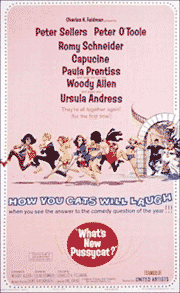
What’s New Pussycat?
1965 • Unrated • 108 mins.
Director: Clive Donner
Confirmed bachelor Michael James (Peter O’Toole) struggles to remain faithful to his fiancée, despite the aggressive pursuit of beautiful, buxom women in this 1960s’ comedy. Peter Sellers plays Michael’s German psychoanalyst Dr. Fritz Fassbender, who attempts to cheat on his own wife (Eddra Gale), who in turn pursues Fassbender with operatic ferocity, dressed in Viking helmet and armed with spear. The characters and their numerous love/hate/lust interests converge in the same hotel, the Chateau Chantelle, entangling in a chase scene that smacks of both Keystone Kops and Benny Hill.
–Betsy Kehne
Twists and Tension: Suspense
Settle on to the edge of your seat for these taut and twisting films, sure to keep you holding your breath until the credits roll.
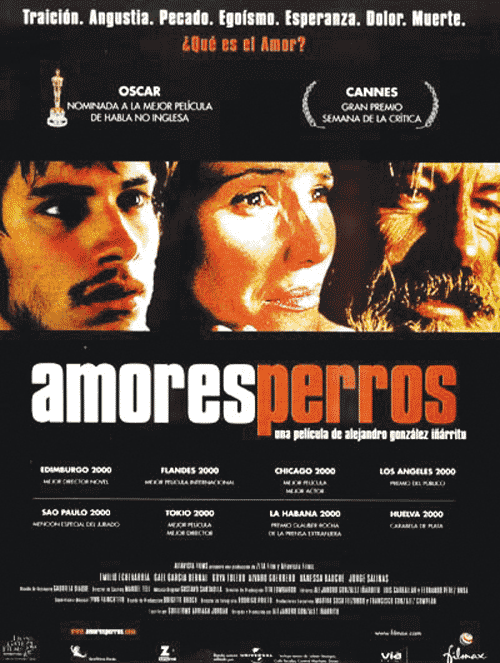
Amores Perros (Love’s a Bitch)
2000 • R • 154 mins. • Spanish w/subtitles
Director: Alejandro González Iñárritu
Love is passion, sacrifice, hope, pleasure, instinct, pain, sin, distress and death. In short, love’s a bitch.
Amores Perros is a perfect peep into life in the dangerous depths of Mexico City. Director Alejandro González Iñárritu’s anthology film contains three distinct stories, connected by a car accident.
The tales reflect the cruel fate of humanity. Bound by their sexual and violent instincts, the inhabitants of Amores Perros end up living darker and more hideous lives than the stray dogs that populate the film — fighting in pits and scrounging for food. Nominated for an Oscar, Amores Perros won the Ariel Award from the Mexican Academy of Film.
The success led González Iñárritu to English-language success, with his two lauded films 21 Grams and Babel.
–Clara Gonzalez de Hall

Absolution
1978 • R • 95 mins.
Director: Anthony Page
The masterful acting of Richard Burton makes this film work. As Father Goddard, priest at a boys’ Catholic boarding school in Britain, he is bound by the seal of the confessional. What starts as a student’s practical joke — meant to scare Goddard — becomes a tangled tale of murder and psychological terror that the priest is bound to conceal.
The Gothic mood of the setting — coupled with a dark and tentative handling of the cinematography — adds to the tension of a story with twists and turns you cannot anticipate. This work doesn’t follow any of the standard formulae for mystery, thriller or suspense, and that is part of its appeal. While the film received little acclaim, it has gained in popularity. For those who thrive on heavy suspense and a complex, haunting mystery, this movie will more than satisfy.
–Alice Snively

Cape Fear
1962 • Unrated • 105 mins.
Director: J. Lee Thompson
A lawyer’s idyllic life frays after he testifies at an attempted rape trial. Sam Bowden (Gregory Peck) never thinks twice about incarcerated Max Cady (Robert Mitchum). But Cady has been thinking about Bowden. Breaking parole, Cady travels to Bowden’s hamlet, lurking on the outskirts of the lawyer’s life, learning his habits and familiarizing himself with Bowden’s wife and daughter (Polly Bergen and Lori Martin). Bowden tries to stop the stalking, but he has no legal means of getting rid of Cady. Desperate, Bowden takes his family to the river — where Cady lies in wait.
More terrifying than Martin Scorsese’s remake, the film draws its tension from Robert Mitchum. Director J. Lee Thompson encouraged improvisation in menacing scenes, giving Mitchum a maniacal glee that clearly unnerved his co-stars. The unpredictability makes every scene with Cady lurching through underbrush, barreling through locked doors and pinning women to walls a study in suspense.
–Diana Beechener
By the Book: Literary Adaptations
From page to screen these films are the perfect Cliff’s Notes to classic novels — not that Bay Weekly condones Cliff’s Notes …

Persuasion
1995 • PG • 107 mins.
Director: Roger Michell
Roger Michell brings the words of Jane Austen to life in his brilliant adaptation of her shortest novel, Persuasion. Anne Eliot (Amanda Root) breaks her engagement with poor naval officer Frederick Wentworth (Ciarán Hinds) at the behest of her family.
Eight years later, Anne tolerates her family’s extravagances while trying to stop their squandering of the family fortune. Her quiet desperation increases when Wentworth, now a wealthy naval captain, reappears. Still resentful of Anne’s rejection, he looks for subtle ways to torment the true love he has never forgotten.
Using natural light and minimalist make-up, Michell accentuates the pastoral feel of Austen’s work. With much of the dialog transcribed from the novel, the film is the perfect reading companion. Michell stays true to character description as well — Anne is plain and Wentworth a weather-beaten sea captain — making Austen’s tale of second chances at first love palpable as it transitions from page to screen.
–Diana Beechener

One Flew Over the Cuckoo’s Nest
1975 • R • 133 mins.
Director: Milos Forman
Director Milos Forman keeps the spirit of Ken Kesey’s classic novel, One Flew Over the Cuckoo’s Nest, but slightly alters Kesey’s written work. On the page, Randle McMurphy (Jack Nicholson) is a stocky redhead, hardly the mirror image of trim, dark-featured Nicholson. More noticeably, the novel is narrated by Chief Bromden, who doesn’t speak on screen until halfway though the film when McMurphy offers him a stick of Juicy Fruit.
Forman’s characterizations are spot-on. McMurphy — opting for institutionalization instead of prison — realizes his relaxing hospital stay is a fight for his freedom. McMurphy’s rebellious spirit defies the hospital rules and encourages a patient uprising, inciting war with villainous Nurse Ratched. You’re drawn into the hospital alongside the patients in an almost claustrophobic setting. Check yourself into this film for a spirited take on Kesey’s asylum opus.
–Michelle Steel

The Grapes of Wrath
1940 • Unrated • 129 mins.
Director: John Ford
Sifted from John Steinbeck’s Pulitzer-winning novel, John Ford’s epic The Grapes of Wrath captures the grit and doggedness of sharecroppers abandoning ancestral farms in the mid-1930s, when drought turned fertile land to barren dust.
Newly-paroled Tom Joad (Henry Fonda), joins his family’s migration down Route 66 to California. The Joads and thousands of others find promised jobs scarce and living conditions deplorable. Ma Joad (Jane Darwell), embodies the indomitable spirit of the families in a finale deviating from the book. Moving to the next hope for work, she claims, “They can’t wipe us out; they can’t lick us. We’re the people.”
Some Steinbeck details are modified, refined or left out, but Nunnally Johnson’s screenplay retains much of the original dialogue and the essence of the book. Impressive black-and-white scenes — reminiscent of Dorothea Lange’s dust bowl photographs — and Ford’s sensitive direction earned the film a place in cinema history and seven Oscar nods.
–Dotty Holcomb Doherty
Gray Area: Black & White
Some films are better without color, which is why they’re still making them that way.

Dead Man
1995 • R • 121 mins.
Director: Jim Jarmusch
A classic American Western blends with art-school sensibilities in this captivating black-and-white gem.
Cleveland accountant William Blake (Johnny Depp) goes West for a job in a steel works town on the fringe of America’s 19th century frontier. But the promised job has been filled, and by a twist Blake finds himself wanted for killing a man. Wounded and lost, he encounters an Indian named Nobody (Gary Farmer), who mistakes him for the ghost of poet William Blake. Together they flee for the northwest coast on a spiritual bent. Journey becomes quest, as Blake limps toward destiny, evolving from frightened man to legendary outlaw.
Black and white hues echo Blake’s tortured soul. Colorless monotone conveys a mood that color can’t, putting elegant polish on the symbolic quest. Jarmusch punches up the story with personality and some levity, preventing the eerie from veering to drear.
–Mark Burns

The Third Man
1949 • Unrated • 104 mins.
Director: Carol Reed
This extraordinary example of film noir is perfect for the black-and-white medium. Partly narrated by its director, the story revolves around post-World War II Vienna and its rampant black market.
Pulp writer Holly Martins (Joseph Cotten), accepts a job from war buddy Harry Lime (Orson Welles). Martins arrives, discovering Lime is dead, purportedly run over by a truck. Suspecting murder, Martins vows to find the truth. He soon falls in love with Lime’s girlfriend, Anna Schmidt (Alida Valli), still strangely devoted to her dead lover, while another murder and graveyard revelation add to the mystery. Trevor Howard also plays a key role in this gripping tale.
The movie was awarded the Grand Prize at the Cannes Festival, Best British Film and a Black and White Cinematography Oscar. With a pedigree that looms as large as the Vienna shadows in Robert Krasker’s cinematography, this film is essential for any black-and-white buff.
–Alice Snively
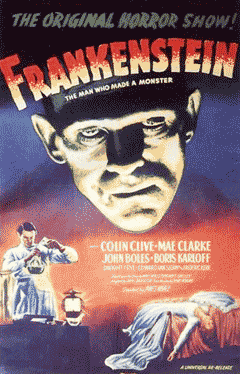
Frankenstein
1931 • Unrated • 71 mins.
Director: James Whale
Among the first talking horror films, Frankenstein captures the dark thrill and terrifying truths of science and humanity that we still wrestle with today — we can, but should we? In this loose adaptation of Mary Shelley’s 1818 novel, a mad scientist uses corpses and the brain of a criminal to create a being stronger and larger than a human. Though Dr. Frankenstein (Colin Clive) and assistant Fritz (Dwight Frye) lock the tormented monster (Boris Karloff) up, he escapes to take revenge on his creator, who is anticipating marriage to Elizabeth (Mae Clarke). Villagers stage a witch-hunt to stop the fiend.
This 1931 film has been remade, sequeled and parodied, but its original form gives us the authenticity of the awkward, primitive, square-headed Boris Karloff, whose face has become synonymous with the iconic monster. The monster crashes through archaic sets, dated language and early cinematography to make this classic still a thrill.
–Carrie Madren
Homegrown: Maryland Films
Bay Weekly shines the spotlight on hometown filmmakers and locales.

Liberty Heights
1999 • R • 134 mins.
Director: Barry Levinson
If HBO’s The Wire makes you nostalgic for 1950s Baltimore, Liberty Heights paints a different, not-so-simple picture of growing up Jewish in Charm City. Baltimore native Barry Levinson — of Diner, Tin Men and Avalon fame — helms this historic coming-of-age tale.
The Kurtzmans seem an ordinary family. The father, Nate (Joe Mantegna), mother Ada (Bebe Neuwirth), older brother Van (Adrien Brody) and younger brother Ben (Ben Foster) live in northwest Baltimore. The kids go to school; Nate buys a new Cadillac every fall. The surprise is Nate’s source of wealth: a strip joint and a numbers racket. But change is in the air. The strip joint is failing, the numbers game is drying up and segregation is ending. Jews, WASPS and African Americans interact — and fall in love. Told with humor, tension and occasional pathos, Liberty Heights is a loving look at time past.
–Ben Miller

Patriot Games
1992 • R • 117 mins.
Director: Phillip Noyce
Here may be the ultimate homegrown Maryland flick: written by local talent, centering on familiar locales and shot largely on location. Go ahead, wave our yellow, red and black flag.
Author Tom Clancy, who began and thrived in his career in Calvert County, brings Jack Ryan (Harrison Ford) home for this tale. The hero returns to Naval Academy teaching duties after saving London royalty from an IRA assassination attempt. But one escapee vows revenge, taking the fight to Maryland with assaults on Ryan and his family. Terrorism just got personal: Ryan must kick some butt by the Bay in the showdown.
Calvert County lore holds that exterior shots of Ryan’s home were filmed at Clancy’s estate — though the scribe distanced himself from the final film. Natives get their Maryland thrills in nearly every scene. Ryan battles thugs and rush hour on Route 50 and Maryland Avenue during harrowing chase scenes.
–Mark Burns

Cry Baby
1990 • PG-13 • 85 mins.
Director: John Waters
With the swagger, singing voice and slicked-back hair of Elvis, Johnny Depp is anything but square bopping through John Waters’ epic Baltimore musical. Depp plays Wade ‘Cry Baby’ Walker, a greaser soul-singer who falls for society square Alison Vernon-Williams (Amy Locane), a good girl yearning for a walk on the wild side. Their musical romance causes a class war, a prison break and some dirty dancing.
Waters’ first studio film features his trademarks: quirky characters like snarling tough Hatchet-Face (Kim McGuire), campy locations from Baltimore to Turkey Point and tongue-in-cheek parody. The film spoofs early Elvis movies and sensationalist 1950s’ teen delinquent films with hilarious results. Waters’ early musical, Hairspray, garners more critical acclaim, but Cry Baby holds its own with a hip-swinging soundtrack, uproarious writing and Johnny Depp’s sneering mug — before it ever set sail on the Caribbean.
–Diana Beechener
Nix on Netflix: Modern Movies to Skip
Bay Weekly suggests you flick these flicks off your Netflix cue and save yourself the frustration.
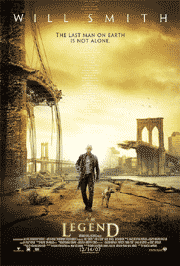
I Am Legend
2007 • PG-13 • 100 mins.
Director: Francis Lawrence
This category is meant to warn people off, but you may want to see I Am Legend. The third film based on Richard Matheson’s 1954 novel of the same name may be irresistible to science fiction fans longing to complete the cycle of The Last Man on Earth (1964) and The Omega Man (1971).
Disaster buffs may enjoy seeing New York City and its inhabitants destroyed for yet another time.
Couch sitters who like noise, unrealistic special effects and scary scenes so frequent that they lose their shocks may want to pass the time with this movie. On the other hand, dog lovers and those who root for Will Smith and happy endings may find I Am Legend a DVD to avoid.
–Ben Miller
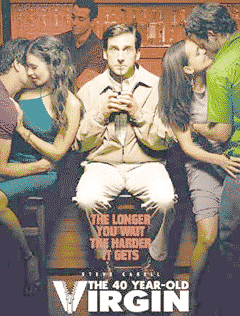
The 40-Year-Old Virgin
2005 • R • 116 mins.
Director: Judd Apatow
Profanity abounds in director Judd Apatow’s 40-Year-Old Virgin, a vulgar comedy about socially inept, action figure-collecting Andy’s (Steve Carell) tentative quest to connect with women.
Guided — or misguided — by three raunchy and brash coworkers, Andy finds superficial lust, trouble and a series of bad choices. Only through following his heart, and taking a risk, does he discover sweet and genuine romance with customer Trish (Catherine Keener). This is the one redeeming part of this storyline. Despite a scattering of true wit, characters favor crude comedy — including partial nudity — over grown-up humor.
Unless your movie tastes run to frat-boy laughs, ban this flick from your Netflix queue.
–Carrie Madren

Norbit
2007 • R • 110 mins.
Director: Brian Robbins
From a director’s point of view, this film might have made sense, as hiring Eddie Murphy to play three characters saves cents. And for a master of caricatures like Murphy, the script may have seemed like fun: After all, how often in one movie do you get to play a wise Chinaman, an obese, foul-mouthed, shrew of a woman and her cuckholded husband, the loveable dim-wit Norbit? Alas, all good intentions go astray from the start of this comedy gone bad.
Yet the badness isn’t in the acting; Murphy disappears into each character like a master of disguise. No, the badness permeates this film from script to storyline, leaving no taboo untouched and no stereotype uncovered. Worst of all, the talented Murphy wallows through it all with a sense of reckless glee, as if he wants to see just how bad a movie he can create while still bringing in millions at the box office.
–J. Alex Knoll
Season’s Greetings: Holiday Films
Every day’s a holiday if you pick the right movie. From the 4th of July to National Geek day, these movies give you a reason to celebrate

Napoleon Dynamite
2004 • PG • 84 mins.
Director: Jared Hess
Noble holiday Dia del Orgullo Friki (Geek Pride Day) started in Spain on May 25, 2006 — the anniversary of Star Wars’ release. Join in and embrace your inner geek. No recent movie trumpets that theme more brightly than Napoleon Dynamite.
The film follows Napoleon (Jon Heder) as he embraces friki pride, making a bold move to usurp social dominance of Happy-Hands hipsters and oppressive jocks in high school elections. Trumpeting his geek nature earns him a moon-booted groove triumph and the affection of a side-ponytailed princess.
Napoleon’s journey from freak to friki chic is core to this holiday’s message. So don’t cower away May 25 like some nervous nerd cub. Embrace this film’s message and roar like a liger.
–Mark Burns

Groundhog Day
1993 • PG • 101 mins.
Director: Harold Ramis
Embittered weatherman Phil Connors (Bill Murray) is forced to repeat my favorite day of the year — Groundhog Day — until he gets it right. Along the way, Phil desperately attempts to break the spell: attempting suicide, robbing a bank and kidnapping the Groundhog. As each day starts anew, Phil realizes good behavior is his only hope.
Punxsutawney Phil transitions from television to film in this hilarious comedy. Expertly navigating through chase scenes, scrunching his nose with the gravitas of a young Lawrence Olivier and scurrying through each scene with a Strasberg-driven commitment to his role, Phil reminds you why Groundhog Day is revered throughout the nation. And the humans are pretty funny too.
–Bay Weekly Groundhog
1776
1972 • PG • 142 mins.
Director: Peter H. Hunt
It’s easy to allow fireworks bursting in air to keep us from remembering that our claim to life, liberty and the pursuit of happiness came from the rumblings of a few white men in a hot, fly-infested Philadelphia room. Peter H. Hunt directs this history lesson, adapting Broadway’s 1776. The film takes a musical romp through the trials and tribulations of John Adams (William Daniels), Thomas Jefferson (Ken Howard) and Benjamin Franklin (Howard Da Silva) as they push a resolution on independency in the Continental Congress.
’Tis true the founding fathers didn’t high-kick while singing a slavery debate, but it’s likely that they collectively rolled their eyes when John Adams took the floor to preach his positions. The blending of fact and fiction makes these historical figures into accessible people. As Adams and his team contend for an uprising, you appreciate the tenacity it took to win our freedom.
–Diana Beechener

Scrooge
1970 • Unrated • 113 mins.
Director: Ronald Neame
Who can resist Albert Finney (as Ebenezer Scrooge) singing, “I hate people. People are despicable creatures, loathesome inexplicable creatures, good-for-nothing kickable creatures. I hate people”? With music and lyrics by Leslie Bricusse, this delightful film pulls no punches with Dickens’ theme of greed on earth and is quite frightening when Scrooge views his death and future in the underworld.
The film becomes sweet and affectionate when Belle (Susanne Neve) — in Scrooge’s past vision — sings longingly to him, “They say happiness is the folly of fools, pity for me, one of the fools.” Finney is fabulous, more so because today he now looks startling as he was made up to look 38 years ago. When the Christmas Past scenes come and you see how young he really was at the time, ’tis startling today.
–Davina Grace Hill
The Great Debate: War & Anti-War Films
Support our troops or give peace a chance? The debate rages on with films demonstrating the valor and violence of battle.

Band of Brothers
2001 • R • 705 mins.
Directors: David Frankel, Tom Hanks, David Leland, Richard Loncraine, David Nutter, Phil Alden Robinson, Mikael Salomon and Tony To
Soldiers march on the horizon, silhouetted by the setting sun as they move toward the next battle. Band of Brothers gives you all the iconic imagery common in WWII cinema but reminds you of the conflict’s price: War isn’t glamorous, good men die, bad man live and those who survive must continue the march.
The 10-part miniseries follows the 101st Airborne’s Easy Company, a group of soldiers who weathered the war’s most horrific battles. Each segment begins with interviews from surviving members of Easy Company, contrasting the aging men with young strong actors who dive over hills and rush into gunfire, reminding you that these soldiers are not super-human. Held together by a bravura performance by Damian Lewis (as Commander Richard Winters), the miniseries boasts fantastic re-enactments and a touching true tale of honor among soldiers.
–Diana Beechener
Gallipoli
1981 • PG •110 mins.
Director: Peter Weir
In World War I Australia, young Archy (Marc Lee), a champion sprinter, and his older running mate Frank (Mel Gibson) join the army out of misguided patriotism and quest for adventure, but find themselves in a war that neither expected.
This coming-of-age story (which earned Gibson Australia’s best actor award) is filled with contrasts: majestic outback vs. muddy trenches; genteel parties vs. slum brothels; military precision vs. mayhem. At the dawn of the ill-fated Gallipoli campaign, infantry messenger Frank races to reach the frontlines before the assault is ordered — and save the lives of his friend and thousands of his comrades. The futility of it all is underscored by British reinforcements, sipping tea on the beach just a mile away.
–Jane Elkin

Zulu
1964 • PG • 138 mins.
Director: Cy Endfield
Military buffs often can’t enjoy a war movie. They know too much about uniforms, buttons, weaponry and terrain. Cinematic inaccuracies ruin their experience. Among historians in the National Park Service — where I once worked — one war film reigns supreme for its accuracy: Zulu.
The battle of Rorke’s Drift — during the Anglo-Zulu War in 1879 South Africa — pitted 139 British soldiers against thousands of disciplined Zulu warriors. For their success in resisting repeated attacks, 11 officers and men received Victoria Crosses, the British equivalent to the Medal of Honor. Zulu shows the horrors and honor of war and features great British character actors of the day, Michael Caine, Stanely Baker and Jack Hawkins. And the accuracy? From the script writers’ use of official British records to craft the battle as it actually happened to the uniforms, belts, sabers and Martini-Henry muskets, this movie is superb.
–Ben Miller
Things That Go Bump in the Night: Horror
It’s that movement you caught in the corner of your eye, the sounds you hear when you’re alone and the sinking feeling in your stomach when you realize it may be too late to escape. These films bring terror into your home with reassurance that it’s only a movie … isn’t it?

28 Days Later
2002 • R • 113 mins.
Director: Danny Boyle
Jim (Cillian Murphy) wakes in a hospital from a 28-day coma to find no one. Buildings stand, electricity flows, but people are gone. Venturing into London’s deserted streets, Jim pieces together that a virus swept through London, causing chaos and death. The movie capitalizes on Jim’s desperate search for answers and survivors.
But he isn’t alone. 28 Days Later features a new breed of zombie: the groaning undead that lumber like molasses, arms akimbo are replaced by the ‘infected’ — rabid humans who hemorrhage blood, run, leap, scream, kill and maim. These careening creatures are extremely contagious. Torn between disbelief and paralyzing terror, Jim scrambles to survive.
In his search for the edge of civilization, Jim encounters the best and worst in survivors, each offering fragments of information on the epidemic unleashed on the city — and the world.
You’ll lock your doors after watching this one. And get a flu shot.
–Betsy Kehne

Poltergeist
1982 • PG • 114 mins.
Director: Tobe Hooper
Playful ghosts haunt a suburban home, communicating with toddler Carol Anne (Heather ‘They’re here’ O’Rourke) through the TV. Tingles turn to terror when Carol Anne is kidnapped and the family, led by patriarch Steve (Craig T. Nelson), is pushed to the edge of sanity to retrieve her.
Poltergeist is the most unforgettably scary film I have ever seen — not gory, just very creepy. Writer Steven Spielberg plays on all the senses to force the family — and you — into cowering submission as they battle violent phantoms they cannot understand or control. Pulling out all the stops, the family must contend with levitation, ecto-plasmatic slime, hallucinations, foul smells, the worst possible cemetery scenario and a psychic detective. Most memorable is the violent animation of inanimate objects such as the killer clown doll that attacks from under a bed and a doorframe that assaults unsuspecting victims as they walk through. Do not watch this alone.
–Jane Elkin

The Wicker Man
1973 • Unrated • 88 mins.; director’s cut 100 mins.
Director: Robin Hardy
Do not mistake this original tale of terror for the pallid recent remake with Nicholas Cage. This 1970s original version is easy to date, thanks to the musical styles and considerable casual nudity.
Sergeant Howie arrives on a remote Scottish Isle owned by the mysterious Lord Summerisle (Christopher Lee) in search of a missing teenage girl. Howie is suspicious of the locals, who worship nature and dodge his questions. He becomes desperate to uncover the isle’s secrets and find the girl. With a screenplay by Anthony Shaffer, the mystery twists with an ending that is unforeseen and profoundly shocking.
–Davina Grace Hill
Family Ties
Grab the family and a bucket of popcorn for these flicks for all ages.
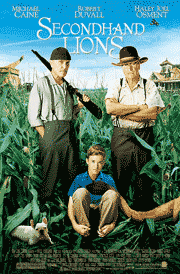
Secondhand Lions
2003 • PG • 111 mins.
Director: Tim McCanlies
Young Walter’s (Haley Joel Osment) summer looks bleak when his will-o-the-wisp mother dumps him with his two crotchety great uncles on a barren Texas farm. But mysteries surrounding the uncles’ 40-year absence, their purported stashed millions and an abandoned photograph of a beautiful woman pique Walter’s imagination. Hardened hearts melt as the uncles take the abandoned Walter under their feisty wings. Then, to further annoy money-grabbing relatives, they take Walter’s advice and go on a wild spending spree, delighting the itinerant salesmen who frequent their door.
Robert Duvall stars as the inimitable Uncle Hub, an enigma who shoots at shyster bankers from the porch by day and swordfights in his sleep near the pond by night. When Walter looks to Uncle Garth (Michael Caine) for answers, the past 40 years unfold in an exotic tale of glory, intrigue and love. Secondhand Lions is a delight, reminding us that at any age, second chances are real.
–Dotty Holcomb Doherty
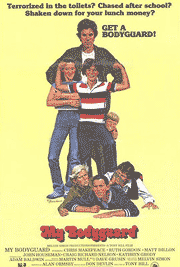
My Bodyguard
1980 • PG • 86 mins.
Director: Tony Bill
As school bully Moody (Matt Dillon) pounds new kid Clifford Peache (Chris Makepeace) into the ground a thought hits Cliff: standing up to bullies only works if you’re bigger. Armed with this revelation, Clifford attempts to hire the school’s scariest behemoth, Ricky Linderman (Adam Baldwin) — returning to school after a mysterious absence — as a bodyguard. School gossip claims Linderman is a cannibalistic serial killer, fresh out of the asylum. Linderman does his best to discourage Clifford, but the puny boy will not yield. Helped by his sassy, hard-drinking Grandmother (Ruth Gordon), Clifford eventually befriends Linderman and realizes the school’s scariest student may just be a big kid with a sad story.
In his screen debut, Baldwin impresses with a sensitive portrayal of a lonely and feared boy, his hulking stature creating a gentle-giant appeal. Look for young Joan Cusack and Jennifer Beals, who complete Clifford’s group of loveable misfits.
–Diana Beechener
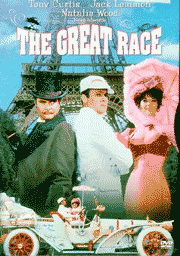
The Great Race
1965 • Unrated • 160 mins.
Director: Blake Edwards
A 1908 car race from New York to Paris pits a hero whose teeth and eyes actually sparkle when he smiles — the Great Leslie (Tony Curtis) — against dastardly Professor Fate (Jack Lemmon) and his clueless sidekick Max (Peter Falk). Saucy suffragette reporter Maggie Dubois (Natalie Wood) stows away with Leslie, determined to get the scoop on the race and rid the hero of his misogynist ways.
It’s a black-and-white view of good and evil, but in living color. Daredevil stunts aplenty and madcap adventures — a Wild West barroom brawl, arctic ice floes stranding, a coup d’état and a gourmet pie fight — make hilarious fun for all ages. Innocent enough for the kids with tasteful adult innuendos, The Great Race is a battle of wits and the sexes for all ages. Lavish costumes by Edith Head and a Henry Mancini score enhance slapstick à la Road Runner.
–Jane Elkin
Creature Features
Some stars are larger than human life.

L’Ours (The Bear)
1988 • Unrated • 94 mins.
Director: Jean-Jacques Annaud
Life’s a bear … especially if you are one. This poignant nature film unlike any other follows an orphaned grizzly cub as he learns to survive by following an older male. Together they forage, play, hunt and are hunted.
You see the world nearly wordlessly through an animal’s eyes and marvel at his range of emotions expressed with lots of sniffing and grunting. Cesar Award-winner Annaud creates a plot by piecing together documentary clips of normal grizzly behavior and staged events including a dogfight, a cougar standoff, a rockslide and a psychedelic trip on mushrooms. The only unrealistic aspect is the elder bear’s acceptance of the cub. Bart the Bear was acclimated to a teddy bear so he would tolerate the real cub.
–Jane Elkin
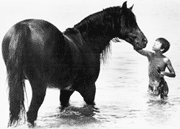
The Black Stallion
1979 • G • 118 mins.
Director: Carroll Ballard
Based on Walter Farley’s children’s book, The Black Stallion captivates you with visual beauty and melodic score. A wild and dangerous Arabian horse and intrepid freckle-faced Alec (Kelly Reno) are the only survivors of a shipwreck. Upon rescue, their bond is tested as the two friends begin an adventure in the world of racing. Featuring a grizzled, old horse trainer (Mickey Rooney) and races, The Black Stallion has everything but a faithful dog to entice you.
The movie’s placid pace may be daunting, but the thrill of the wild is still there: The boy teaches the black stallion to trust, and the horse teaches the boy to realize his strength. Young children may fear early scenes of shipwreck and animal cruelty or yawn at artistic scenes of beachside galloping. Older children and equestrian enthusiasts chomp at the bit for this film.
–Ben & Cathy Conway Miller

Kaijû Sôshingeki (Destroy All Monsters)
1968 • G • 88 mins. • Dubbed from Japanese
Director: Ishirô Honda
A race of evil space women — Kilaaks — enslave the minds of the monsters in Monsterland and unleash them upon the world in a bid to make way for megalithic space dragon King Ghidorah. It’s up to Captain Katsuo Yamabe (Akira Kubo) and the crew of SY-3 to break the Kilaaks’ hold on the monsters and save Earth.
Ninth in the Godzilla catalog — with the most monsters ever — the film reveals the rich biodiversity of Monsterland. Effects are cornball, but it’s filmed well, good fun and a fine introduction for fresh seekers to Toho Studios’ inimitable monster melees.
–Mark Burns
In Memoriam
In 2007, film world lost two great directors, Michaelangelo Antonioni and Ingmar Bergman — but the losses we memorialize were three women who opened our hearts.

Sayonara
1957 • Unrated • 147 mins.
Director: Joshua Logan
When Sayonara appeared in 1957, World War II was still a painful national wound and Japan the vicious samurai wielding the sword. For moviegoers — and who wasn’t in the 1950s? — flower-delicate Miyoshi Umeki helped heal the wound with her gentle portrayal of Katsumi Kelly.
But Sayonara is no hothouse romance. James Michener’s story points to American prejudice — represented by military bureaucracy in occupied Japan — rather than Japanese warmongering as Sayonara’s villain. Joshua Logan’s dramatization carried the indictment to the big screen. Innocent Katsumi and her airman husband — played sad and straight by comedian Red Buttons — take their own lives rather than separate when he’s ordered back to the States alone. In a softened ending, sizzling fighter pilot Marlon Brando refuses to say sayonara to his Japanese love.
Umeki, who won an Academy Award for her role, died Aug. 28 of cancer at 78.
–Sandra Olivetti Martin
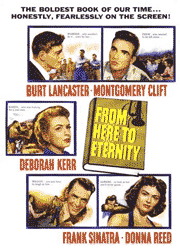
From Here to Eternity
1953 • Unrated • 118 mins.
Director: Fred Zimmermann
Who can forget From Here to Eternity’s wave-crashed clinch on the beach? Film lore has it that Deborah Kerr and Burt Lancaster went to Director Fred Zinnermann and suggested the addition of this brief moment that has become part of cinematic legend. The film follows the affairs and contentions of a group of military men and their wives on a small base in Hawaii — just before Pearl Harbor.
Kerr startled audiences by casting aside her wholesome image with her portrayal of an adulterous wife. Kerr’s costars — Frank Sinatra, Donna Reed, Ernest Borgnine — also stretch themselves with unexpected and against-type portrayals. Kerr died this year leaving 90-year-old Borgnine as the last remaining cast member of this enduring, evocative film.
–Davina Grace Hill

Annie Get Your Gun
1950 • Unrated • 107 mins.
Director: George Sidney
As Betty Hutton whooped and danced through George Sidney’s musical wild west show, she taught me two truths: Anything worth saying is worth belting, and you can’t get a man with a gun — unless you’re Annie Oakley. Hutton — who succumbed to cancer in early 2007 — immortalized the role of Little Miss Sure-Shot in this rollicking musical following the meteoric rise of Annie Oakley from country bumpkin to famous sharpshooter. Along the way, Annie learns how to read, hobnobs with royalty and starts a bickering romance with fellow sharpshooter Frank Butler (Howard Keel).
Paired with Keel, Hutton shines as the spunky heroine. Singing “Anything You Can Do, I Can Do Better,” Hutton raises her voice for girl power long before the Spice Girls. With excellent support from Louis Calhern as Col. Buffalo Bill Cody, Annie Get Your Gun remains a classic musical for every pistol-packing mama.
–Diana Beechener
|